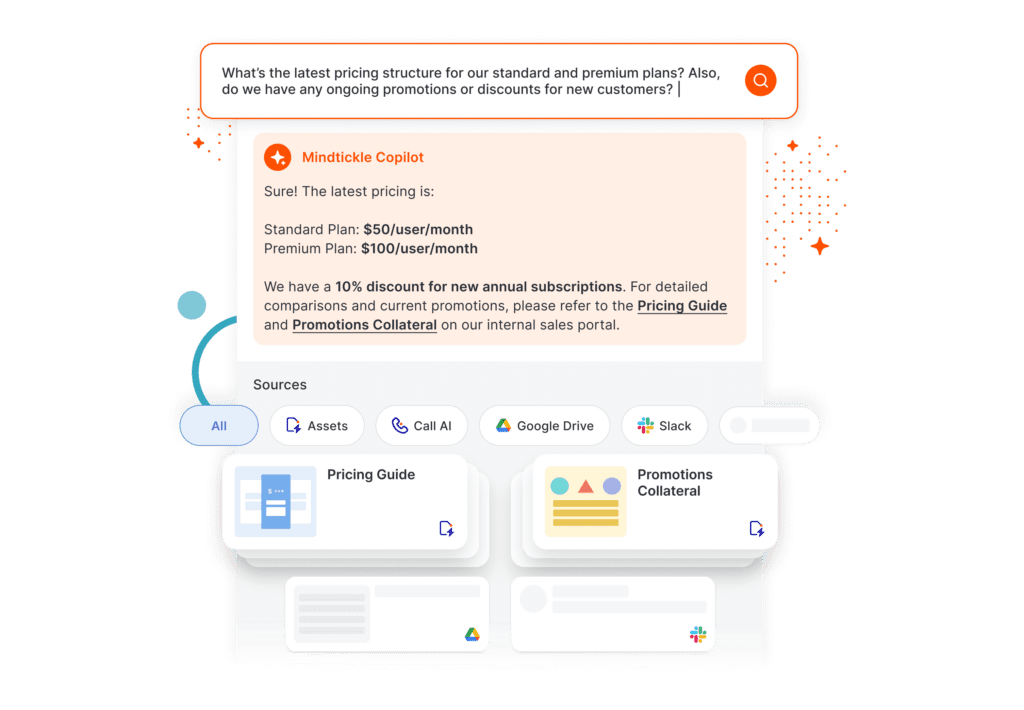It’s no secret that sales reps are critical in driving revenue growth. But they’re not doing it alone.
Winning organizations understand that sales is a team effort, and sales teams need the right support to be successful. Of course, many teams support sellers throughout the sales cycle. However, two teams play particularly important roles: sales enablement and sales operations.
While sales enablement and sales operations aim to boost sales productivity, they’re not the same. Read on as we look at what sales enablement and sales operations are, how they differ, and why the two teams must align to drive sales success.
Sales enablement and sales operations explained
Before we dive into the key differences between sales enablement and sales operations, let’s take a step back to define each of these terms.
What is sales enablement?
Sales enablement (also referred to as revenue enablement) is the practice of equipping sellers with the information, content, and tools they need to be effective and efficient in their roles and achieve their sales quotas. Sales enablement aims to create an entire team of top performers who have what it takes to engage buyers throughout the sales process.
In the business world, sales enablement is a relatively new concept, but it’s quickly caught on. Per the 2024-2025 Chief Revenue Officer + Sales Leader Outlook Report, 84% of organizations invest in a sales enablement department. This isn’t surprising, as sales enablement can have a large, measurable impact on the sales metrics that matter most.
What is sales operations?
Behind every deal, there are a ton of moving pieces. Sales operations (also known as sales ops) is the term used to describe the “behind the scenes) activities and processes that support the revenue organization. The goal of the sales ops team is to ensure sellers can work faster and smarter.
Though sales operations teams were once the unsung heroes of the revenue organization, they’re now getting the recognition they deserve. Research from Salesforce found that more than eight in 10 sales professionals believe sales ops plays a “critical role in growing the business.”
It’s important to note that while sales operations focus on supporting the sales team, revenue operations (or RevOps for short) examine how sales operations connect with other parts of the business that drive revenue.
What’s the difference between sales enablement and sales operations?
Sales enablement and sales operations are certainly related, as they are both responsible for supporting the sales team and increasing sales effectiveness. In addition, both teams typically report to the Chief Revenue Officer. However, sales enablement and operations are not the same, as each team supports the sales team differently.
B2B buyers have lofty expectations. Sellers must have the right skills and behaviors to meet those expectations and close more deals. Sales enablement supports the sales team by delivering training, information, and coaching to help sales reps build and hone their skills to succeed.
Sales enablement teams also collaborate with sales and marketing teams to ensure sales reps have the right sales content for any sales situation. This is an important way to support sellers, as B2B buyers rely on sales content to make informed buying decisions.
While the duties of the sales enablement team vary from organization to organization, some common sales enablement responsibilities include:
- Sales onboarding
- Creating and delivering continuous learning programs to ensure sales reps are always prepared
- Support sales reps with training and enablement for product launches
- Creating opportunities for sales reps to practice the skills they’ve learned
- Establishing a sales coaching program and equipping sales managers with the tools, data, and best practices to deliver personalized coaching at scale
- Collaborating with marketing and sales to develop sales content and deliver training and sales enablement to ensure sales reps know how and when to use key sales content
- Continuously measuring the impact of various elements of sales enablement on seller performance and optimizing accordingly
Sales operations, on the other hand, supports the sales team by building and optimizing processes that ensure the revenue organization can run as a well-oiled machine.
Some examples of common sales operations responsibilities include:
- Developing sales forecasts
- Managing sales pipeline
- Contributing to revenue strategies
- Developing and evaluating sales reps’ compensation plans
- Creating pricing structures for products and service offerings
- Leveraging data to optimize sales processes
- Measuring and analyzing sales metrics
Sales operations teams are also responsible for implementing and administering the tools and technologies sellers rely on to be successful. Some examples of such sales tools and technologies are customer relationship management (CRM) platforms, sales enablement platforms, revenue productivity tools, and sales content management systems.
How can sales enablement combined with sales operations drive sales success?
Sales enablement and sales operations aren’t the same. But both organizations help revenue organizations reach their sales goals and boost quota attainment.
As such, these two teams need to form a strong partnership. That way, there is alignment, which is especially important when the responsibilities of the two teams overlap – which they often do.
For example, imagine you’re rolling out a new CRM across the entire team. Typically, the sales operations team is responsible for setting up the new platform and ready for the sales team to use. This might include taking the lead on setting up accounts for each sales rep and building key dashboards for different roles to use.
But providing the sales team with a new tool and leaving them to their own devices isn’t effective. Instead, the sales enablement team must create and deliver sales training and sales enablement that ensures sales reps know how and when to use the new tool. This will increase adoption and ensure sellers use the tool as effectively as possible.
Power your sales enablement and sales ops with Mindtickle
Sales reps play a key role in growing revenue. However, sellers need the right support to be effective in their roles and achieve their sales quotas.
Sales enablement and sales operations are both key to a winning sales strategy. While the goal of both sales enablement and sales operations teams is to support the sales organization, the way they go about achieving this goal differs.
Sales operations teams evaluate and optimize processes that make sales reps more productive. Sales enablement teams create and deliver the training, enablement, coaching, and content sellers need to engage buyers and close more deals.


Both sales enablement and sales operations teams rely on the right tools and technology to accomplish their goals.Today, the world’s best enablement and revenue teams leverage Mindtickle’s integrated revenue productivity platform to drive team performance.







